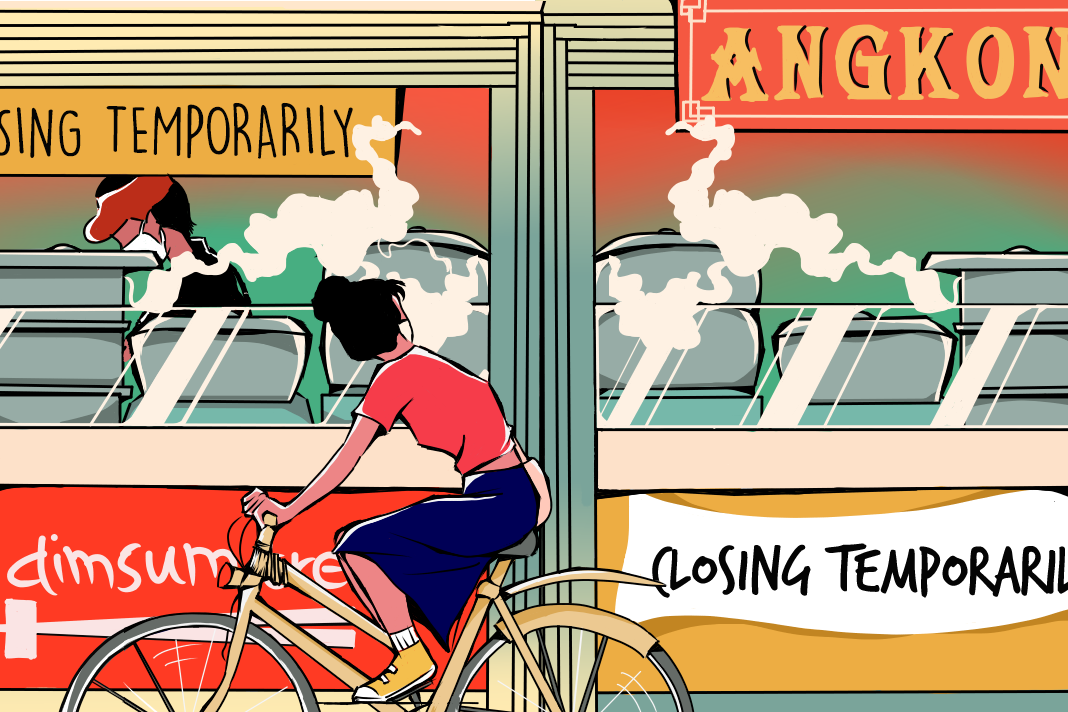FOOD BUSINESSES around the University are struggling amid the Covid-19 pandemic, with some forced to close after years of operations.
Chiquitos owner Celine Tabia told the Varsitarian in an interview she was forced to close her Tolentino Street branch due to lack of customers and the inability to negotiate for a lower store rent.
“Since mas malaki `yung rent kailangan ko siyang i-close para mag down-size, at `yong cash flow na natitira sa business mapaikot at eventually makapag-survive,” she said.
Chiquitos Laon Laan branch continues operations for the sake of the employees even if it is no longer profitable, she said.
“Mas malaki pa `yong malulugi mo kesa mag-open ka. Ayun, so ngayon nago-open na lang ako para sa mga tao ko, hindi na ako nage-expect ng profit ngayon kasi medyo mahirap talaga,” she said.
Leo Sioco, one of the owners of Dimsum Treats and Karaage Koto, said the transition of the University to online classes led to the loss of their eateries’ primary patrons.
“Since the majority of our market are really students, it was a really big hit for us,” he told the Varsitarian in an interview.
Four Dimsum Treats branches were closed. Only the store on Dapitan Street remains open, he said.
Karaage Koto at Padre Noval Street was also closed and its Dapitan branch was merged with Dimsum Treats.
“Out of the existing five branches, we were forced to close four, for the meantime kasi nga the direction is towards online learning na nga,” Sioco said.
Challenge to MSMEs
College of Commerce and Business Administration Dean Leonardo Canoy said medium, small and micro enterprises (MSME) would find it difficult to operate during the pandemic given the loss of customers.
“Most of the small businesses around the University will close shop considering that the primary consumers are no longer in existence. The chances to sell in order to cover expenditures and liabilities are very low,” he told the Varsitarian in an interview.
Canoy also cited problems such as insufficient collateral, limited credit histories and banking relationships, inadequate financial records, lack of business plans, and high interest rates.
“Even prior to the incidence of the Covid-19 pandemic, the small business owners were already perennially and persistently burdened by the above mentioned reasons,” he said.
He said the pandemic only worsened the difficulties of MSME owners.
“The presence of the virus only exacerbated the situation and may lead to sudden demise for most, if not all of the small businesses,” he said.
Department of Trade and Industry data as of May 2019 showed that 99.56 percent of business establishments in the country were considered MSMEs.
Going online for survival
Canoy said that for MSMEs to survive, business owners must “redefine” their target market, since students who were their primary customers won’t have classes at least until the remainder of the year.
“There is a need to reassess the target market they need to pursue relevant to their product offerings,” Canoy said.
He also encouraged businesses to establish online presence.
“If their business can adapt to be present in the virtual market, and communicate through social media then tap the possibility of being inclusive in the market, the probability of sales might be there,” he said.
Erick Liwag, in-charge of Taste from the Greens’ operations on V. Concepcion Street, said the store was able to survive because of the delivery service platform of Grab Food.
“Noong May, pure Grab lang, walang walk-in. Sa business, bumaba talaga kasi halos 90% estudyante [ang customers],” he told the Varsitarian in an interview.
Grab Food delivery man Jericho Cabuñas said in an interview with the Varsitarian his income increased during the enhanced community quarantine in March because people were encouraged to stay at home.
“Medyo lumakas naman `yong Grab noon, lumakas [kita namin], kasi walang lumalabas kundi kami lang,” he said.
Cabuñas also observed that Grab Food delivery men increased during the quarantine period, resulting in competition.
“Dumami kami, kaso humina naman kita, kasi binigyan din ni Grab ng opportunity `yong walang mga trabaho,” he said.
In an interview with The Straits Times, Grab Philippines Public Relations Manager Arvi Lopez said the online platform experienced a “fourfold increase” in deliveries since the quarantine started.
Tabia of Chiquitos however said the volume of orders from Grab Food was not enough for her to continue operations, so she resorted to selling sauces and chicken chops.
“Sa Grab, meron naman pero kulang pa rin, kahit anong effort ngayon sa sales na dumating kulang pa rin talaga kung ico-compare mo siya sa pre-Covid,” she said.
“Nag-come up kami ng bottled sauces at saka frozen chicken chops, with that, nakatulong naman siya sa sales,” she added.
Tabia said she even tapped tricycle drivers for deliveries to help the community.
Sioco of Dimsum Treats and Karaage Koto said they were able to survive due to many resellers.
“For the past few months, madami kasing inquiries sa online selling, [so] we started offering package selling to communities,” he said.
Sioco said most of their retailers were Thomasian alumni who liked their products.
“Siguro kasi, our store opened in 2008, mag-12 years na, so UST alumni who are familiar with the products, [ngayon] kine-cater nila,” he said.
Tabia and Sioco vowed to reopen their branches after the pandemic and when face-to-face classes resume.
Many other food businesses around the University are still operating, such as 24 Chicken and dimsum eatery Angkong, which operates through online deliveries.
Big players Jollibee on Asturias Street and McDonald’s on Padre Noval have ceased operations. Nuel Angelo D. Sabate and Camille M. Marcelo




















